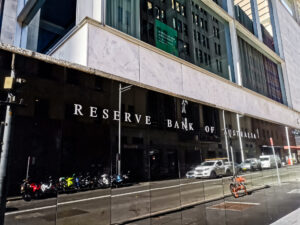The cost of mortgages is soaring and households are spending less in the shops – the Reserve Bank should hold off on raising rates again next week
Since May last year, the Reserve Bank has increased the cash rate from 0.1% to 3.1%. The latest cost of living data released this week reveals that this has incurred a 61% rise in mortgage repayments for the typical employee household.
As policy director, Greg Jericho notes in his Guardian Australia column, this increase has had a dramatic effect on people’s ability to spend money elsewhere. The latest retail trade data released on Tuesday showed a dramatic fall in retail spending in December. The 3.9% fall in the nominal amount spent is increased once you consider the inflation. Even if you account for the tendency for monthly figures to be erratic, the last three months of 2022 saw a stalling of retail spending and a decline in real terms.
Clearly, the rate rises are forcing people to spend less on retail items and other discretionary purchases. This of course is the intended impact. Raising interest rates increases the cost of borrowing and reduces the level of demand in the economy. But the danger is that the Reserve Bank increases interest rates so fast and so greatly that it slows demand by more than is needed.
Given the impact of the 300 basis points rises has yet to fully flow through as current mortgage holders typically see their interest rates rise only a month or two after each increase by the Reserve Bank we can expect the cost of mortgage repayment to keep rising in the first quarter of this year.
With the data already showing the pain of rate rises is causing changes in household spending. The Reserve Bank shod not raise the cash rate when it meets next week, but wait to see the full impact flow through to the economy. After a 300 basis points rise in 8 months no one can suggest the Reserve Bank has been too timid. The fast increase now gives them room to wait and observe rather than keep slamming on the brakes.
Between the Lines Newsletter
The biggest stories and the best analysis from the team at the Australia Institute, delivered to your inbox every fortnight.
You might also like
Fearful and frozen: Why the Reserve Bank continues to err on rates
The RBA’s failures have real consequences. It should go back and closely reread the recommendations of the RBA review, particularly the ones that encourage it to open up to new and diverse viewpoints.
Delayed RBA cut is welcome, but borrowers are still lagging
The RBA has cut interest rates – five weeks too late.
As inflation falls, the Reserve Bank is Missing in Action
With inflation within the RBA’s target range, interest rates should be cut, but unfortunately Australians will have to wait for the Reserve Bank board to get back from holidays.


